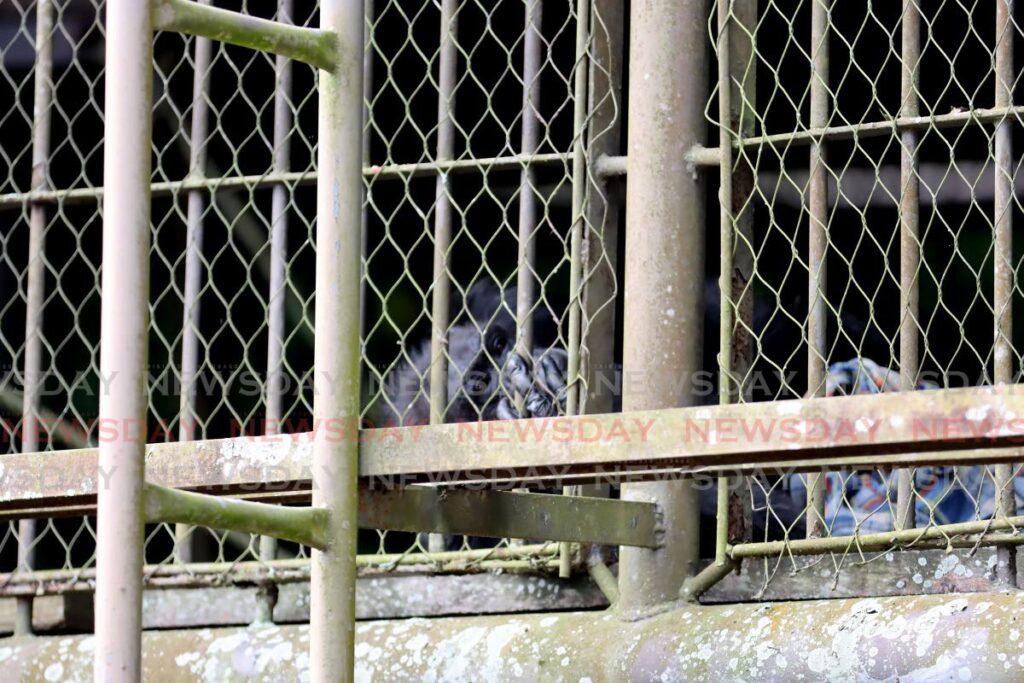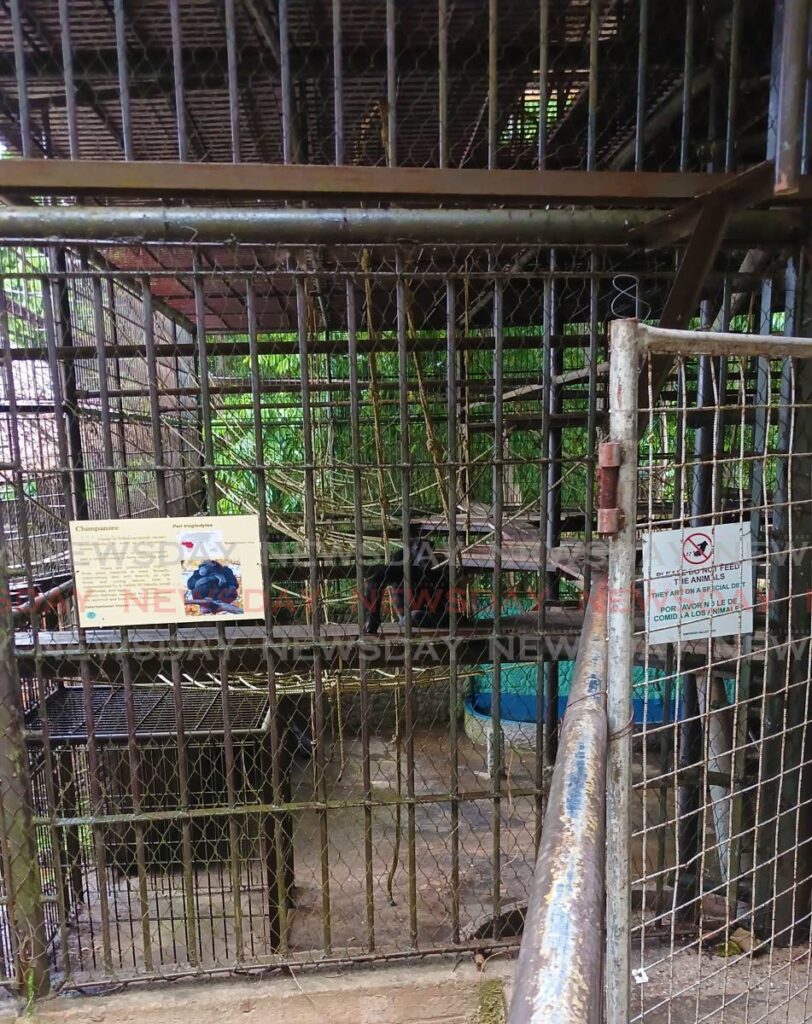Trinidad and Tobago's love for Sudi the chimp

AGED somewhere between 50-55 years old, Sudi is the last remaining chimp in TT.
Standing at three-and-a-half feet with a shaggy, greyish-black coat, the primate's home is at the far north end of the Emperor Valley Zoo in Port of Spain.
She is described as one of the zoo’s main attractions by a keeper.
On August 28, a rainy Wednesday, Newsday tried visiting Sudi only to find the path leading to her enclosure blocked off by a yellow rope and a sign that read “Pathway Closed.”
Sudi was neither seen nor heard from and an employee explained repairs to her enclosure were underway owing to her display being temporarily closed.
The zoo’s president, Gupte Lutchmedial, in a phone conversation with Newsday on August 28, advised an e-mail be sent.
Returning on August 29, under clearer skies, Newsday found the sign still posted, but this time another employee said it was due to landscaping work.
From the giraffe enclosure, she was seen dragging a colourful blanket.
Newsday e-mailed the zoo administration at zs.tt@homatil.com on August 29, requesting an interview to discuss Sudi’s care, including the costs, her diet, enrichment activities, health status and vet visits, among other things.
Despite five follow-up attempts at the zoo to speak with management, Newsday was unsuccessful.
An employee during one of the visits claimed Sudi had been ill for two months and was quarantined for her health.
After calling the Zoological Society on September 9, Newsday was told someone would return its call no later than September 10.
On September 12, after visiting the zoo again, Newsday was asked to resend its interview request due to the initial e-mail being sent to the e-mail's spam folder. The request was resent within minutes.
On the same day, an employee said a vet visited the facility earlier that morning. The employee said vet visits occur every other day.
September 13, attempts to reach Lutchmedial via phone and WhatsApp went unanswered.
In 2013, Sudi, who had been at the zoo for over 30 years, attempted an escape. She was spotted by zookeepers walking upright and roaming the primate section after escaping into the general compound.
No members of the public were present at the time, as the zoo opens at 10 am and the incident occurred around 8.30 am.
During her escape, she climbed into an overhanging tree. She was sedated while climbing down and returned to her enclosure without any injuries.
That was the first and only time she attempted to escape. Reports say while free she was calm and explored her surroundings.
In April 2015, a Facebook video showed Sudi playing with a new doll she had been gifted as part of the Emperor Valley Zoo's ongoing Animal Enrichment Programme.
On September 9, 2016, Sudi was back in the national spotlight as an artist after a video posted by the zoo showed her drawing on a sketchpad with a pen.
During Newsday's September 12 visit, her sketch pad was seen nearby.
The post said the activity was part of her Animal Enrichment Programme, aimed at stimulating her both mentally and physically "to enhance her quality of life and prevent stereotypic behaviours in captivity."

A 2011 study by the University of Kent, UK, found that captive chimpanzees often display signs of compromised mental health, including behavioural abnormalities akin to mental illness in humans, such as self-mutilation, repetitive rocking, faeces eating and urine drinking.
The research, conducted by Dr Nicholas Newton-Fisher and Lucy Birkett from the University’s School of Anthropology and Conservation and published in PLoS ONE, attributed these behaviours to limited opportunities for social adjustment, restricted and barren living spaces and significant human management, which contrasts with their foraging and decision-making processes in the wild.
Later in 2016, Sudi was given a television, which remains in her enclosure to this day. Lutchmedial told Newsday it provided mental stimulation "given the intelligence of primates."
He said the television gives Sudi an opportunity to see movements and hear sounds. Regarding companionship, he said the zoo was expecting six new chimps.
A YouTube video from August 17, 2019, says guests at the zoo often feel a special connection with Sudi.
“It is possible this connection is because 98.8 per cent of DNA is shared between chimpanzees and humans, making them our closest genetic relatives in the animal kingdom. This feeling of camaraderie is the result of her human-like mannerisms and intelligence. Sudi the chimpanzee is no ordinary ape, as she is more human.”
It says Sudi was adopted by a Canadian couple who had no children and wanted to complete their family.
"She filled a void in their hearts and was raised as a child, learning to use the bathroom, take baths and go for walks."
However, as Sudi grew larger and stronger, her physical power became difficult for them and she was given to the Toronto Zoo.
At the zoo, Sudi was taught sign language to help her communicate with carers. She, at the age of four, along with two other chimpanzees (Kiji and Njugo), was transferred to the Emperor Valley Zoo. She has outlived both chimps.
The video concluded by urging viewers to visit Sudi at the Zoo. “Feel free to have conversations with her, as she understands more than you may think!”
In an April 11, 2016, interview with Newsday, Lutchmedial said Sudi had formed a special bond with a long-time friend of the zoo for over a decade, Betti Gillezeau.
He said Gillezeau visits Sudi every day.
Lutchmedial expressed appreciation for Gillezeau’s dedication to Sudi’s well-being and said their interactions are part of a supervised programme.
“We pride ourselves on prioritising the welfare of our animals and work closely with Gillezeau to ensure compliance with the zoo’s standard operating procedures.”
According to the World Wildlife Fund, chimps are highly social animals that care for their offspring for years and can live to be over 50 years old. They are human relatives, sharing about 98 per cent of our genes.
Their natural habitat is the forests of Central Africa and they spend most of their time on treetops. They can walk on their legs for distances of up to a mile and use sticks to fish for termites from mounds and bunches of leaves to soak up drinking water.
The International Union for Conservation of Nature has listed chimps as endangered. Their population decline is due to habitat loss, poaching and diseases.
Chimpanzees are susceptible to many of the same diseases as humans, including Ebola and slow reproduction, which makes it challenging for their population to recover quickly. In captivity, chimpanzees can live up to 60 years.

Comments
"Trinidad and Tobago’s love for Sudi the chimp"